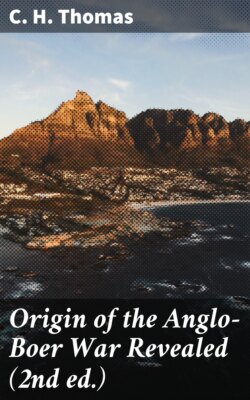Читать книгу Origin of the Anglo-Boer War Revealed (2nd ed.) - C. H. Thomas - Страница 7
На сайте Литреса книга снята с продажи.
TRANSVAAL HISTORY—SUZERAINTY
ОглавлениеTable of Contents
The references made to the history of the Transvaal so far reach up to the rehabilitation of its independence and the convention of 1881. Some of the conditions of that treaty, especially the subordinate position imposed by the suzerainty clause, were found to be repugnant to the burghers. Delegates were therefore commissioned to proceed to England in order to get the treaty so altered as to place the State into the status provided by the Sand River convention, which conceded absolute independence. Mr. Jorrison, a violent anti-English Hollander, was the chief adviser of the members of that delegation.
To that the English Ministry could not assent, but sought to meet the wishes of the people by agreeing to certain modifications of the convention of 1881. This was effected with the treaty of 1884. The delegates had specially urged the renunciation of the suzerainty claim, but that claim appears not to have been abandoned, to judge from the absence of such mention in the novated treaty. Had its renunciation been agreed to, as has been since averred, it is quite certain that the delegates would not have been content without the mention in most distinct terms of that, to them, so important point. It may therefore be assumed as a fact that the negotiations did not result in an active suspension of the relations as set forth in the convention of 1881, and that the Transvaal continued in a status of subordinacy to England, but only with a wider range in regard to conditions of autonomy. To most lay minds it therefore appears perfectly clear that the Transvaal delegates had well understood and accepted, and so had also their Government, that the convention of 1884 was de facto a renewal of that of 1881, with the only difference that it provided an enlarged exercise of autonomy, but without in the least abrogating the principles of respective relations, which were left intact, or at least latent.
It has been averred and a strong point made in the theory of repudiating suzerainty or over-lordship that Lord Kimberley had given the assurance that the right of Transvaal autonomy and independence was meant to equal that of the Orange Free State. This need not be contested, as that Minister obviously relied upon a similar observance of staunch adhesion towards England which that State had shown during a period of thirty years previous; the fact that the Transvaal was quite differently situated as to adjoining territory imposed the necessity, if only as a matter of form, to preserve the written conditions of Transvaal vassalage.
Lord Kimberley, in 1889, intimated the readiness of his Government to afford advisory and other co-operation with the Transvaal Government in order to cope with the new element of foreign immigration, resulting from the discovery of the rich gold-fields, and to provide appropriate relations with a new floating population, without materially altering the status of Transvaal authority, or the methods of government then in practice.
The Transvaal Government, however, preferred to ignore that loyal offer, and to be guided by Bond principles instead. That circumstance affords another proof that England did not then see the necessity, as has subsequently been the case, of strengthening her position against Bond aggression by imposing a demand of general franchise for Uitlanders.
One aspect of the prolonged controversy re suzerainty forced upon England would be to denote a lack of honour, which is not of unfrequent occurrence when one party to a contract seeks by cavil and legal quibble to evade compliance with some of its conditions, simply because the written terms appear to afford scope for doing so. But the principal reason of the Transvaal contention proceeded from the project of gaining over some strong foreign ally who would see an obstacle, if not scruples, in joining common cause whilst England's claim of over-lordship remained unshaken. But for that consideration the Transvaal Government inwardly viewed the whole of the treaties as waste paper, since it was not only intended to violate them all, but also to bring about, at an opportune moment, a hostile severance from England. In the meantime, the academic squabble was to serve as a decoy to hide Transvaal identification with any such sinister objects, and to divert attention and suspicion.
